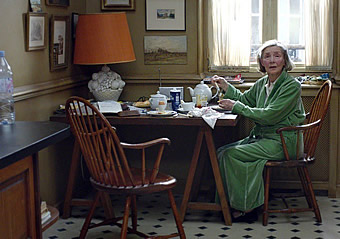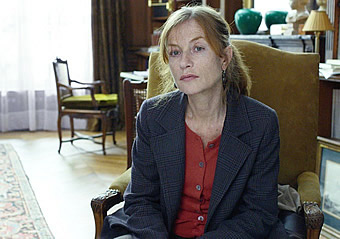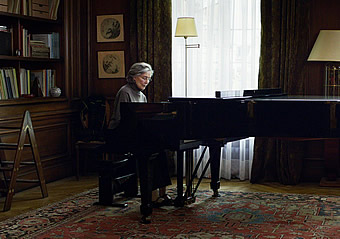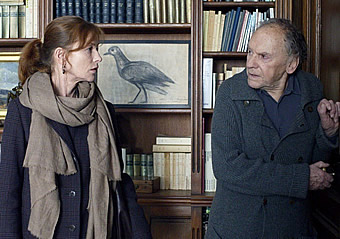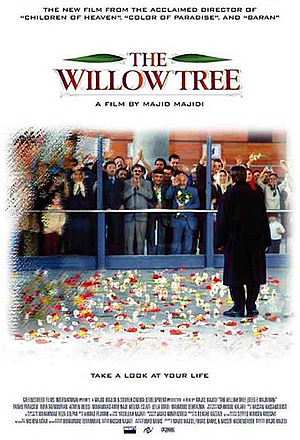AMOUR (2012)
Genre: Drama
Director: Michael Haneke
Cast: Jean-Louis Trintignant, Emmanuelle Riva, Isabelle Huppert, William Shimell, Rita Blanco, Laurent Capelluto
RunTime: 2 hrs 7 mins
Rating: NC-16 (Some Nudity)
Released By: Cathay-Keris Films
Official Website: http://sonyclassics.com/amour/
Opening Day: 27 December 2013
Synopsis: In the film, Georges (Trintignant) and Anne (Riva) are in their eighties. They are cultivated, retired music teachers. Their daughter (Huppert), who is also a musician, lives abroad with her family. One day, Anne has an attack. The couple's bond of love is severely tested.
Movie Review:
The title means ‘love’ in French, but the love portrayed here is not the kind of love that Hollywood likes to show, nor for that matter the kind of romantic love the French and their capital Paris are commonly associated with. Rather, Michael Haneke’s latest film depicts a test of the kind of love pledged in a marriage vow – “in sickness and in health, in good times and in bad, till death do us part”- through an elderly husband’s care for his dying wife in the wake of two debilitating strokes.
We’d like to warn you first and foremost that this is not an easy movie to watch, especially for the recently bereaved. Haneke’s portrayal here is no less cruel than the realities of life, and his keenly observed and intimately told story of married love in the midst of adversity might cut too close to reality for some members of the audience. That however in no way diminishes the value of this movie, and indeed we’d like to think that it is a very important movie, one that should be seen by all married couples in fact.
The reason for this is simple – it’s easy to love a person when everything is fine and dandy, but the true revelation of the depth of one’s love for his or her spouse comes when the other falls ill and becomes incapable of looking after himself or herself. Such a predicament is exactly what Georges (Jean-Louis Trintignant) finds himself faced with one morning at breakfast, when his wife Anne (Emmanuelle Riva) suddenly loses any sign of response or recognition. Without showing Anne’s visit to the hospital, Haneke cuts straight to the chase – as a result of her first stroke, she has been paralysed from the waist down on her right side.
Their subsequent days together are the subject of the movie, as we are shown in great detail how Georges looks after Anne with tender loving care. Not only does he keep her company by reading and talking to her, Georges also takes it upon himself – despite having an uneasy gait – to look after her daily needs of food, bath and movement. Though many of the scenes concern the minutiae of their daily lives, they ultimately paint a detailed and engrossing picture of the day-to-day challenges faced by Georges.
But Haneke isn’t content to just relate the story from Georges’ point of view; at least for the first half of the movie, we are also privy to Anne’s thoughts of her illness. When Georges steps out of the house one evening to attend a funeral, Anne tries to commit suicide by jumping out of the window – and underneath her desperation we see a woman filled with pride and dignity who is unwilling to let nature’s course rob both away from her, so much so that she even refuses to let her own daughter Eva (Isabelle Huppert) visit her.
As such circumstances are prone to get in life, Anne’s condition takes a turn for the worse in the second half of the movie. A second stroke renders her bedridden, incoherent and almost non-responsive, and her sharply deteriorating state means that Georges even has to employ two nurses in shifts to look after her. If the first half was a mildly hopeful picture of enduring love, then this second half is truly a painful watch. Particularly heart-wrenching is a scene where Anne refuses to eat nor drink despite Georges’ pleas that she would die otherwise, leading to a momentary outburst by Georges that takes the both of them as well as the audience aback.
More so than any other movie in recent history, we are led to feel for the caregiver – in this case, Georges – whose patience, determination and commitment goes beyond what the human mind can envisage. It is a selflessness beyond any other, and what makes it even more affecting here is how Georges continues to care and tend for Anne despite knowing full well that little of what he does will ultimately alleviate her suffering. Even though the ending which explains Anne’s eventual demise might prove controversial to some, there is still never a doubt of Georges’ love for Anne.
Credit for that also goes to Trintignant and Riva, both veteran actors putting away all signs of pretension to deliver riveting performances as Georges and Anne respectively. Without the appropriate nuance, both roles could easily have been farce, but thanks to Trintignant and Riva, the film manages some remarkable shots - such as one continuous sequence where Georges feeds Anne one mouthful at a time or another where Georges strokes the upper-side of Anne’s palm to stop her from crying like a little child.
Like we said at the start, this is not a movie you go to feel good about. In fact, it is utterly sobering, waking you up to the realities of life, love, sickness and death. Coming after an equally intense ‘The White Ribbon’, Haneke displays yet another brilliant example of raw minimalist filmmaking that cuts deep and hard into such realities. ‘Amour’ may not portray the kind of love that we’d like to see, but this is nonetheless an extremely important movie about love – ultimately, it is a love that remains strong in the midst of adversity, a love that endures through sickness and in health, and a love that remains the same through good and bad times that is a love worth keeping.
Movie Rating:




(A bleak and unflinchingly realistic portrayal of enduring and undying love)
Review by Gabriel Chong
You might also like:
AMOUR (2012)
Genre: Drama
Director: Michael Haneke
Cast: Jean-Louis Trintignant, Emmanuelle Riva, Isabelle Huppert, William Shimell, Rita Blanco, Laurent Capelluto
RunTime: 2 hrs 7 mins
Rating: NC-16 (Some Nudity)
Released By: Cathay-Keris Films
Official Website: http://sonyclassics.com/amour/
Opening Day: 27 December 2013
Synopsis: In the film, Georges (Trintignant) and Anne (Riva) are in their eighties. They are cultivated, retired music teachers. Their daughter (Huppert), who is also a musician, lives abroad with her family. One day, Anne has an attack. The couple's bond of love is severely tested.
Movie Review:
The title means ‘love’ in French, but the love portrayed here is not the kind of love that Hollywood likes to show, nor for that matter the kind of romantic love the French and their capital Paris are commonly associated with. Rather, Michael Haneke’s latest film depicts a test of the kind of love pledged in a marriage vow – “in sickness and in health, in good times and in bad, till death do us part”- through an elderly husband’s care for his dying wife in the wake of two debilitating strokes.
We’d like to warn you first and foremost that this is not an easy movie to watch, especially for the recently bereaved. Haneke’s portrayal here is no less cruel than the realities of life, and his keenly observed and intimately told story of married love in the midst of adversity might cut too close to reality for some members of the audience. That however in no way diminishes the value of this movie, and indeed we’d like to think that it is a very important movie, one that should be seen by all married couples in fact.
The reason for this is simple – it’s easy to love a person when everything is fine and dandy, but the true revelation of the depth of one’s love for his or her spouse comes when the other falls ill and becomes incapable of looking after himself or herself. Such a predicament is exactly what Georges (Jean-Louis Trintignant) finds himself faced with one morning at breakfast, when his wife Anne (Emmanuelle Riva) suddenly loses any sign of response or recognition. Without showing Anne’s visit to the hospital, Haneke cuts straight to the chase – as a result of her first stroke, she has been paralysed from the waist down on her right side.
Their subsequent days together are the subject of the movie, as we are shown in great detail how Georges looks after Anne with tender loving care. Not only does he keep her company by reading and talking to her, Georges also takes it upon himself – despite having an uneasy gait – to look after her daily needs of food, bath and movement. Though many of the scenes concern the minutiae of their daily lives, they ultimately paint a detailed and engrossing picture of the day-to-day challenges faced by Georges.
But Haneke isn’t content to just relate the story from Georges’ point of view; at least for the first half of the movie, we are also privy to Anne’s thoughts of her illness. When Georges steps out of the house one evening to attend a funeral, Anne tries to commit suicide by jumping out of the window – and underneath her desperation we see a woman filled with pride and dignity who is unwilling to let nature’s course rob both away from her, so much so that she even refuses to let her own daughter Eva (Isabelle Huppert) visit her.
As such circumstances are prone to get in life, Anne’s condition takes a turn for the worse in the second half of the movie. A second stroke renders her bedridden, incoherent and almost non-responsive, and her sharply deteriorating state means that Georges even has to employ two nurses in shifts to look after her. If the first half was a mildly hopeful picture of enduring love, then this second half is truly a painful watch. Particularly heart-wrenching is a scene where Anne refuses to eat nor drink despite Georges’ pleas that she would die otherwise, leading to a momentary outburst by Georges that takes the both of them as well as the audience aback.
More so than any other movie in recent history, we are led to feel for the caregiver – in this case, Georges – whose patience, determination and commitment goes beyond what the human mind can envisage. It is a selflessness beyond any other, and what makes it even more affecting here is how Georges continues to care and tend for Anne despite knowing full well that little of what he does will ultimately alleviate her suffering. Even though the ending which explains Anne’s eventual demise might prove controversial to some, there is still never a doubt of Georges’ love for Anne.
Credit for that also goes to Trintignant and Riva, both veteran actors putting away all signs of pretension to deliver riveting performances as Georges and Anne respectively. Without the appropriate nuance, both roles could easily have been farce, but thanks to Trintignant and Riva, the film manages some remarkable shots - such as one continuous sequence where Georges feeds Anne one mouthful at a time or another where Georges strokes the upper-side of Anne’s palm to stop her from crying like a little child.
Like we said at the start, this is not a movie you go to feel good about. In fact, it is utterly sobering, waking you up to the realities of life, love, sickness and death. Coming after an equally intense ‘The White Ribbon’, Haneke displays yet another brilliant example of raw minimalist filmmaking that cuts deep and hard into such realities. ‘Amour’ may not portray the kind of love that we’d like to see, but this is nonetheless an extremely important movie about love – ultimately, it is a love that remains strong in the midst of adversity, a love that endures through sickness and in health, and a love that remains the same through good and bad times that is a love worth keeping.
Movie Rating:




(A bleak and unflinchingly realistic portrayal of enduring and undying love)
Review by Gabriel Chong
You might also like:
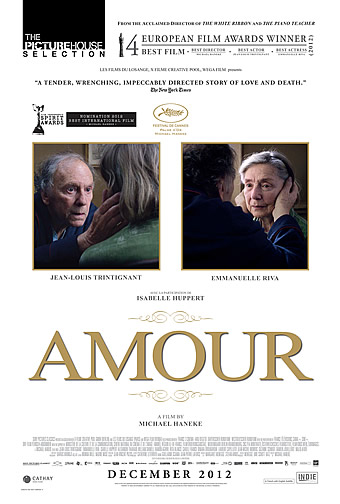
Movie Stills
